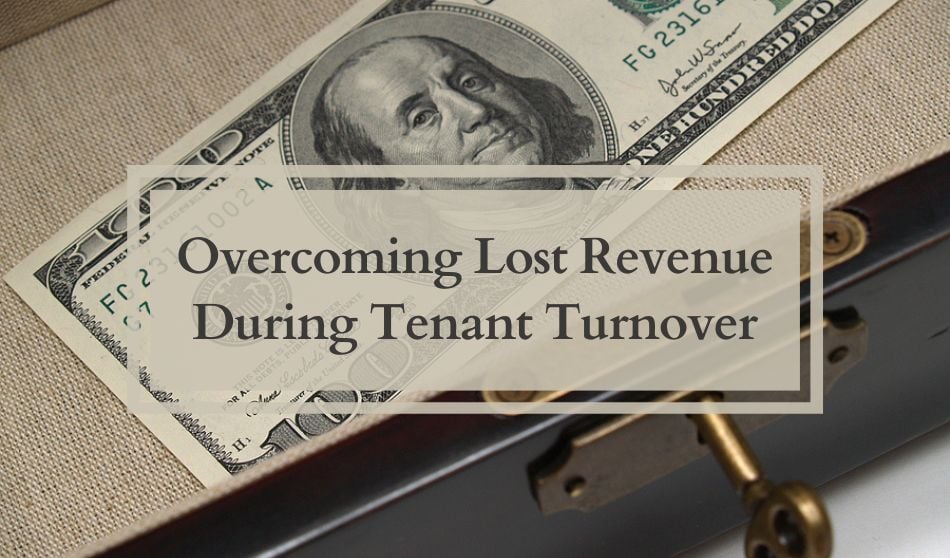
You may be leaving money on the table. There are certain challenges to overcoming lost revenue during tenant turnover. Understanding your options may help avoid revenue loss and increase profits.
Steps to Take Prior to Scheduled Move Out
As soon as a resident has submitted a move out notice there are steps to take immediately to prevent lost revenue.
- Acknowledge the move out notice and move out date in writing. This can avoid any misunderstandings and clarify the day you expect the unit to be empty and keys returned.
- Schedule a pre-move-out inspection to allow the resident the opportunity to know what items they are expected to repair or replace and areas needing additional cleaning.
- Often a resident will misunderstand the purpose of a security deposit and withhold the last month’s rent. Highlight the lease terms regarding the security deposit and other deposits held. Inform the tenant if last month’s rent payment is due. Offer a preliminary invoice outlining any outstanding payments due and steps that will be taken if not paid before move out.
- Final move-out inspection should occur on the day they are returning the keys and the unit is completely emptied. Walk the inspection with the tenant, taking pictures, and discussing issues found that will be deducted from the security deposit.
Now is the time to collect a forwarding address and verify contact phone numbers!
Disposition of Deposit After a Tenant Move Out
A disposition of deposit is an itemized accounting of the cost to bring the property back to a rentable condition beyond common wear and tear. It would also include any outstanding past due rent, prorated rent charge or refund of rent, and any other incidentals owed or due.
Typically an itemized disposition of security deposit form is used to break down these amounts in a clear manner. In most states, it is required to mail this disposition of deposit to all tenants who vacated the unit. Some states stipulate a timeframe for when that document must be post-dated.
Security Deposit Laws: The Complete State Guide for Landlords, Property Managers, & Renters
Mailing a disposition of deposit does not guarantee repayment. In fact, tenants may refute the fees assessed from their security deposit. This is when good documentation, photographs, cleaning and repair receipts, and persuasive communication all come in handy. But if they still refuse to pay, it may be time to escalate efforts to recover lost revenue.
Debt Recovery After Tenant Move Out
Letter Campaign
A former tenant might ignore the initial request for repayment. However, consistency may get their attention. Certified letters sent periodically remind former tenants that the debt is not simply going to disappear. A formal demand letter from an attorney or paralegal may send a clear signal that repayment is required.
Arbitration
When a former tenant disagrees with your assessment of debt owed, you might offer a dispute resolution meeting with an arbitrator. Better yet, both parties could come to a dispute resolution compromise without an outside mediator. Just be sure to get all agreements in writing.
Rent Recovery Service
Debt collectors proficient in rent recovery could be the solution when arbitration and other tactics have not been successful. These rent recovery services can be employed anytime help is needed to collect. Look for a collection agency that specializes in debt collection for the rental industry.
Small Claims Court
Most often a court appearance is associated with evictions. However, suing a former tenant for unpaid rent is an option to recover lost revenue anytime there is an outstanding amount due. Winning a civil suit case gives a landlord greater fighting power to pursue repayment by way of wage garnishments and tax garnishments.
Tax Break or Insurance Claim
It may be possible to recover lost revenue even if the former tenant does not respond. Check with an accountant to find out if you are able to claim passive losses for lost rental income or other types of tax deductions. Contact your insurance company about provisions for lost rental income for circumstances outside your control such as a disaster forcing tenants to move out.
Tips to Protect Against Rental Revenue Loss
In addition to having a plan for recovering lost revenue, it is important to have a game plan to avoid the situation from the start. To avoid a sticky situation of chasing funds after a tenant has moved, these tips could help proactively protect against revenue loss.
Tenant Screening
Have clear tenant screening, interview, and application processes in place. Be consistent and thorough. Call all references, check employment and housing details, consider employing a debt-to-income ratio matrix as well as credit score criteria.
Deposits
Consider collecting both a solid security deposit as well as last month’s rent in advance if your state and local regulations allow. Again, if allowable, some landlords collect additional deposits for cleaning, appliance rental, pets, keys, etc. that may or may not be refundable.
Alternatively, you could replace cash security deposits all together and offer security deposit insurance. Security deposit insurance is a surety bond where the renter pays a small monthly fee to the provider who insures each home for the property owner in case of damages and lost rent that might occur. Check your property management software to see if they offer security deposit insurance from providers such as Rhino.
Late Fees
The lease agreement should have clear criteria on the topic of late fees. On the first and subsequent late payments follow through with the late fee assessment. Conversely, consider an on-time full payment concession (discount) or create a points program for a prize pool or earning awards such as a gift card.
Inspections
Routine inspections are paramount. Knowing the condition of the property keeps those move-out surprises to a minimum. Consider adding a pre-move-out inspection. This inspection informs tenants of the criteria needed to qualify to receive the greatest amount of deposit back. It also allows landlords to get a glimpse of what to expect for turnover costs.
(Updated from original article published November 2019)





